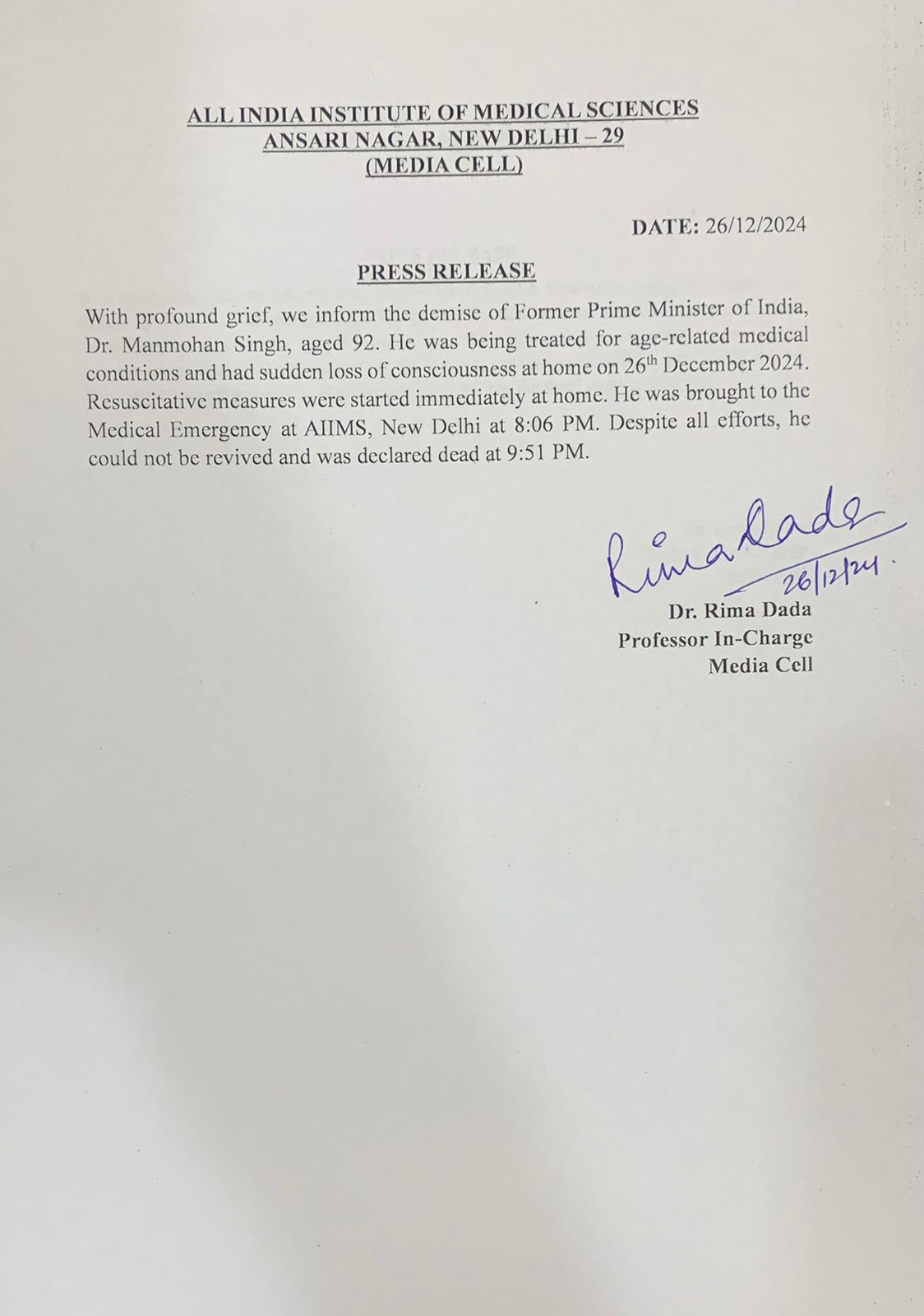On the 26th of December, India suffered a huge loss with its former Prime Minister Dr. Manmohan Singh left his body at the age of 92. He was admitted to AIIMS, Delhi late in the evening following a deterioration in his health. Despite the best efforts of doctors, he was declared dead shortly after admission. Dr. Singh had been battling a prolonged illness.

Dr Manmohan Singh was a towering figure in Indian politics. He served as the 13th Prime Minister of India from 2004 to 2014 as he led the UPA 1, UPA 2 government consecutively. The efforts of Dr Manmohan Singh can also be witnessed in terms of economics. He played a pivotal role in steering India through significant economic transformations. As Finance Minister in the early 1990s, he was the architect of India’s economic liberalization, which opened the country to globalization and set it on a path of rapid growth. Dr Manmohan Singh was among a few in politics who was respected by both the ruling party as well as the opposition.
PM Modi condoles Former Prime Minister’s death
Joining the nation in condoling the demise of Dr. Manmohan Singh, PM Modi wrote, “India mourns the loss of one of its most distinguished leaders, Dr. Manmohan Singh Ji. Rising from humble origins, he rose to become a respected economist. He served in various government positions as well, including as Finance Minister, leaving a strong imprint on our economic policy over the years. His interventions in Parliament were also insightful. As our Prime Minister, he made extensive efforts to improve people’s lives.”
India mourns the loss of one of its most distinguished leaders, Dr. Manmohan Singh Ji. Rising from humble origins, he rose to become a respected economist. He served in various government positions as well, including as Finance Minister, leaving a strong imprint on our economic… pic.twitter.com/clW00Yv6oP
— Narendra Modi (@narendramodi) December 26, 2024
Congress leader Priyanka Gandhi tweeted, “Few people in politics inspire the kind of respect that Sardar Manmohan Singh ji did. His honesty will always be an inspiration for us and he will forever stand tall among those who truly love this country as someone who remained steadfast in his commitment to serve the nation despite being subjected to unfair and deeply personal attacks by his opponents. He was genuinely egalitarian, wise, strongwilled and courageous until the end. A uniquely dignified and gentle man in the rough world of politics.”
Few people in politics inspire the kind of respect that Sardar Manmohan Singh ji did.
His honesty will always be an inspiration for us and he will forever stand tall among those who truly love this country as someone who remained steadfast in his commitment to serve the nation… pic.twitter.com/BXA6zHG2Fq
— Priyanka Gandhi Vadra (@priyankagandhi) December 26, 2024
Pre-political carrer
Dr Manmohan Singh was born on September 26, 1932, in Gah, Punjab (now in Pakistan). A scholar in economics, Singh began his academic journey as a senior lecturer at Panjab University (1957–1959), later serving as a reader (1959–1963) and professor (1963–1965). His expertise in economics earned him a position at the United Nations Conference on Trade and Development (UNCTAD) from 1966 to 1969.
Returning to India, Singh became an advisor to the Ministry of Foreign Trade, appointed by Lalit Narayan Mishra. He also served as a professor of international trade at the Delhi School of Economics from 1969 to 1971. Singh’s entry into public service began in 1972 when he was named Chief Economic Adviser in the Ministry of Finance.
He later held key roles, including Secretary of the Finance Ministry (1976), Governor of the Reserve Bank of India (1982–1985), and Deputy Chairman of the Planning Commission (1985–1987). His global economic acumen was further demonstrated as Secretary-General of the South Commission in Geneva.
In June 1991, Prime Minister P. V. Narasimha Rao appointed Singh as India’s Finance Minister, marking the start of a transformative political career that reshaped India’s economic landscape.
Following 1991, Dr Manmohan Singh reached the depth of the ocean named Indian politics. He proved to be a successful finance minister and then was chosen as the Prime Minister of the country in 2004. From 2004 to 2014 he remained at office and led the Congress UPA1,UPA2 alliance.

























